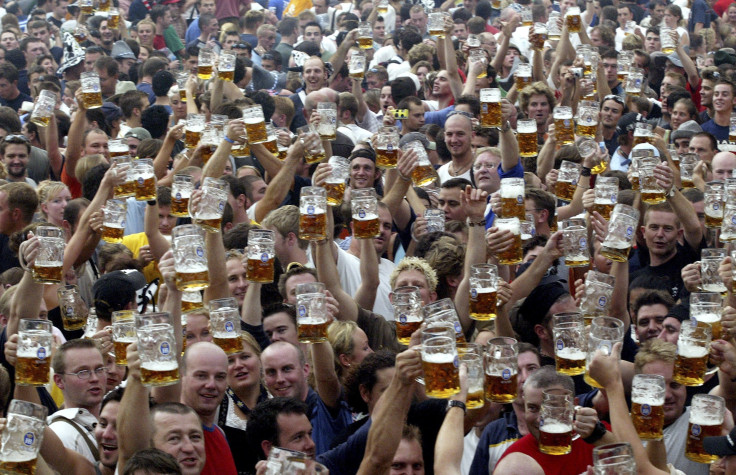Alcohol Ads Fail To Qualify 'Drink Responsibly' Message With Real Health Advice

It seems a tad disingenuous, doesn’t it? Alcohol ads aren’t even allowed to depict people consuming the stuff they’re peddling, but some 87 percent of ads feature the disclaimer to “drink responsibly,” as if, by some weird logic, abstinence were the only way to do so.
To be certain, it’s not. Liquor, beer, and wine companies all want you to drink their booze — that much is obvious. But juxtaposed beside cryptic words invoking a sense of responsibility, alcohol ads introduce a more health-conscious, if altogether curious, intention. If most alcohol companies encourage us to drink responsibly, why don’t they tell us how, exactly, we are supposed to accomplish that?
"The contradiction between appearing to promote responsible drinking and the actual use of 'drink responsibly' messages to reinforce product promotion suggests that these messages can be deceptive and misleading," said David Jernigan, director of the Center on Alcohol Marketing and Youth at the Johns Hopkins Bloomberg School of Public Health, in a statement.
Jernigan is the co-author of a new study into alcohol ads, and he’s interested in learning more about why the whole “drink responsibly” campaign is so heavy on (implied) drinking and less so on the actual responsibility end. He and two of his colleagues from the Bloomberg School of Public Health studied all alcohol ads that appeared in U.S. magazines from 2008 to 2010. All told, the team analyzed 1,795 advertisements.
They scanned the glossy photos of merriment and libation for any messages that would reflect a company’s efforts to warn consumers of a product’s potential health risks. A full 87 percent of ads used some form of a “drink responsibly” message. An otherwise hopeful sign, precisely zero of the more than 1,500 of these ads went on to elaborate on what responsibility would look like, either in limiting personal consumption or drinking weaker alcohol.
The majority of the ads focused instead on brand and product promotion, which may be unsurprising; after all, these are ads. The only reason they exist in the first place is to sell more hard lemonade or mid-shelf vodka. The researchers contend alcohol companies can do better, particularly if they make the active choice to tell consumers to drink responsibly. Unlike tobacco companies, which are required by federal law to warn of smoking’s dangers on their packaging, the only constraint alcohol faces is that no one be seen consuming it in any promotional message.
So why do they pretend to care? The researchers don’t have a well-defined answer. It could be because perceived good will is better than no good will, or because, as the team found, 87 percent of the industry is already doing it. “Drink responsibly,” or some incarnation of that sentiment, furnishes the ad to give consumers the impression of consistency, as if the remaining 13 percent isn’t simply indifferent, but reckless.
The problem of why companies decide to advise us to be responsible is less concerning than the problem of how to handle it, the research team says. “We know from experience with tobacco that warning messages on product containers and in advertising can affect consumption of potentially dangerous products," said study leader Katherine Clegg Smith, an associate professor in the Department of Health, Behavior, and Society. "We should apply that knowledge to alcohol ads and provide real warnings about the negative effects of excessive alcohol use."
These would come in the form of prominent health warnings featured in bold text, not illegible micro-print buried at the bottom. For advertisers to adopt these practices, change would need to come at a legal level. They’d need to be verified as cognitively sound, the researchers argue, meaning they are sure to stick with people. Consumers may be surprised to learn, for instance, a person is killed in an alcohol-related car accident every 48 minutes, or that kids who start drinking before age 15 are four times more likely to become alcoholics than those who don’t drink until they hit 21.
So what does “drink responsibly” actually mean? DISCUS, the Distilled Spirits Council of the United States, for one, can’t answer that. The organization’s latest Code of Responsible Practices says only that “Responsible drinking statements should be included in beverage alcohol advertising, marketing materials, and promotional events where practicable.” It fails to define “responsible drinking” in any meaningful sense.
If the research is anything to go by, the National Institutes of Health defines safe drinking as consuming one drink per day if you are a woman and two drinks per day if you are a man. Of course, such a wholesome and mundane form of alcohol consumption isn’t befitting a high-res rave splashed inside a magazine. Those people aren’t drinking responsibly, you might think. Well, that’s where the alcohol companies have you, because technically speaking (and that’s the only type of speak that matters), those people aren’t drinking at all.
Source: Smith K, Cukier S, Jernigan D, Defining strategies for promoting product through 'drink responsibly' messages in magazine ads for beer, spirits, and alcopops. Drug and Alcohol Dependence. 2014.
Published by Medicaldaily.com



























